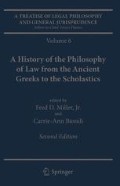Abstract
The Digest (or Pandects), promulgated at Constantinople on December 16, 533, by the Roman emperor Justinian (527–565, born ca. 482), is perhaps the most influential text in the history of Western legal thought. Together with Justinian’s Code (promulgated on April 7, 529, with a second edition in 534), and his Institutes (533), it constituted what in the sixteenth century came to be known in Western Europe as the Corpus of Civil Law (Corpus Iuris Civilis). Justinian’s Novels (or New Constitutions)—imperial pronouncements from 535, supplemented by post-Justinianic directives from as late as 575—together with the Digest and Code are our principal sources for the philosophical underpinnings of Justinian’s conceptualization of his legislative activity; for the philosophy of law that animated Tribonian, architect of the actual codification; and for the philosophy of law implicit in the finished text of the Digest itself.
Section 10.1 of this chapter was written by Thomas M. Banchich; Sections 10.2–4 by John Marenbon; and Section 10.5 by Charles J. Reid, Jr. All translations are by the authors unless otherwise indicated.
Access this chapter
Tax calculation will be finalised at checkout
Purchases are for personal use only
Notes
- 1.
Section 10.1 of this chapter was written by Thomas M. Banchich; Sections 10.2–4 by John Marenbon; and Section 10.5 by Charles J. Reid, Jr. All translations are by the authors unless otherwise indicated.
- 2.
These constitutions, each traditionally referred to by its opening words—Deo Auctore, Omnem, and Tanta, the third also in a Greek version, the initial word of which is Dedôken—precede Book I of the Digest. For translations, see The Digest of Justinian, ed. Watson 1998, vol. 1: xliii–lxxi.
- 3.
Nomos empsychos in the Greek version, see Novels, 507, lines 9–10; lex animata in the Latin, see Novels, 507, lines 7–8. For comment and translation, see Dvornik 1966, vol. 2: 722. On the history of the concept of a ruler as law animate, see Steinwenter and the references under nomos empsychos at Dvornik 1966, vol. 2: 965.
- 4.
See Chapter 11 of this volume for the philosophical developments that took place in this legal context.
- 5.
The glossators and legal commentators made extensive use of ancient and medieval philosophers. On metaphysical thought in late medieval jurisprudence see the essay by Andrea Padovani in Volume 7 of this Treatise, and on the use of logic and metaphysics see the essay by Andrea Errera in the same volume.
- 6.
For fuller discussion of politics in western medieval jurisprudence see the essay by Kenneth Pennington in Volume 7 of this Treatise.
- 7.
See Hostiensis 1581, De homicidio voluntario c. 1, v. diffidatus.
Author information
Authors and Affiliations
Editor information
Editors and Affiliations
Rights and permissions
Copyright information
© 2015 Springer Science+Business Media Dordrecht
About this chapter
Cite this chapter
Banchich, T.M., Marenbon, J., Reid, C.J. (2015). The Revival of Roman Law and Canon law. In: Miller, F.D., Biondi, CA. (eds) A Treatise of Legal Philosophy and General Jurisprudence. Springer, Dordrecht. https://doi.org/10.1007/978-94-017-9885-3_10
Download citation
DOI: https://doi.org/10.1007/978-94-017-9885-3_10
Publisher Name: Springer, Dordrecht
Print ISBN: 978-94-017-9884-6
Online ISBN: 978-94-017-9885-3
eBook Packages: Humanities, Social Sciences and LawLaw and Criminology (R0)

